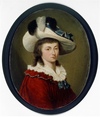CONGER, WILSON SEYMOUR, merchant, sheriff, and politician; b. 1804 at Hallowell, Upper Canada, first son of Peter Conger and Elizabeth Stapleton, née Seymour; he was married and had no children; d. 27 July 1864 of tuberculosis at Peterborough, Canada West.
Wilson Seymour Conger may have operated the furniture factory at York (Toronto) where Paul Kane* was employed. Kane between 1834 and 1836 painted portraits of Conger and his wife. In 1829 Conger was at Cobourg where he soon entered municipal public life. In 1831 he was secretary of the building committee of the Upper Canada Academy (later Victoria College). He ran as a Reformer in Northumberland riding in 1834, advocating a Trent valley canal, a tariff on American agricultural produce, adoption of the secret ballot, popular election of the Legislative Council, and the abolition of primogeniture. He lost to Alexander McDonell and John Gilchrist*. He opposed the William Lyon Mackenzie radicals and supported the government during the Rebellion of 1837.
Conger was involved in the formation of the Cobourg and Peterborough Railway Company in 1835, and sat on the Cobourg Board of Police from 1837 to 1841, serving as president of that body in 1839. He moved to Peterborough after being appointed sheriff of the Colborne District on 22 Dec. 1841, and was sheriff of Peterborough County from 1849 until 1856.
At Peterborough Conger’s interest in municipal improvements did not abate. In 1848 Conger, Judge George Barker Hall, Frederick Ferguson, and Charles Perry drafted the resolutions which led to the bill incorporating Peterborough. Conger was a town councillor from 1850 to 1859 and mayor in 1856, reeve of North Monaghan Township in 1854 and deputy reeve in 1857, and Peterborough County warden in 1859. He was also Peterborough’s first chief engineer. In 1851 the county council rejected a proposal by Conger which would have wrested control of the rear townships from land speculators and absentee owners and opened them up for settlement. He suggested that municipalities purchase crown lands for nominal sums, and sell them to settlers. The proceeds would have been used to establish a permanent common school fund and to build good roads in the county.
Conger was elected mla for Peterborough in an 1856 by-election after John Langton* resigned the seat to become auditor general. He ran as a supporter of the Conservative government, defeating his Reform opponent, Frederick Ferguson, who was supported by George Brown* in accusing Conger of holding on to his post as sheriff while seeking election. Conger endorsed separate schools if they were self-supporting, thereby winning the bulk of the Roman Catholic vote. In the assembly he dealt mainly with local issues such as roads, temperance legislation, revision of the Common School Act, and construction of the Trent canal. In the general election of 1857 he was defeated by Thomas Short.
In June 1858 George Brown charged in the committee on public accounts that Conger had been a party to the withholding of £2,000 worth of municipal debentures during their transfer from Wolford Township to the town of Peterborough. Conger was sued by the town and lost the suit in 1859, despite attempts by Conservative friends on the town council to protect him. Nevertheless, Conger was re-elected to the legislature by acclamation in 1863 as an independent. He died in office at a time when his committee work dealing with the Trent canal proposal was nearing completion.
City of Peterborough, Ont., Office of the Chief Clerk, Corporation of the Town of Peterborough, minutes, 1850–63. Municipal Council of the County of Peterborough, Minutes of proc. (Peterborough, [Ont.]), 1850–63. Cobourg Star (Cobourg, [Ont.]), 1834–35. Peterborough Examiner (Peterborough, [Ont.]), 1856–64. Peterborough Review (Peterborough, [Ont.]), 1853–64. G. W. Craw, The Peterborough story: our mayors, 1850–1951 ([Peterborough, Ont., 1967]). E. C. Guillet, Cobourg, 1798–1948 (Oshawa, Ont., 1948). T. W. Poole, A sketch of the early settlement and subsequent progress of the town of Peterborough . . . (Peterborough, [Ont.], 1867).
© 1976–2024 University of Toronto/Université Laval
Cite This Article
Kenneth W. Johnson, “CONGER, WILSON SEYMOUR,” in Dictionary of Canadian Biography, vol. 9, University of Toronto/Université Laval, 2003–, accessed April 16, 2024, http://www.biographi.ca/en/bio/conger_wilson_seymour_9E.html.
The citation above shows the format for footnotes and endnotes according to the Chicago manual of style (16th edition). Information to be used in other citation formats:
| Permalink: | http://www.biographi.ca/en/bio/conger_wilson_seymour_9E.html |
| Author of Article: | Kenneth W. Johnson |
| Title of Article: | CONGER, WILSON SEYMOUR |
| Publication Name: | Dictionary of Canadian Biography, vol. 9 |
| Publisher: | University of Toronto/Université Laval |
| Year of publication: | 1976 |
| Year of revision: | 1976 |
| Access Date: | April 16, 2024 |









